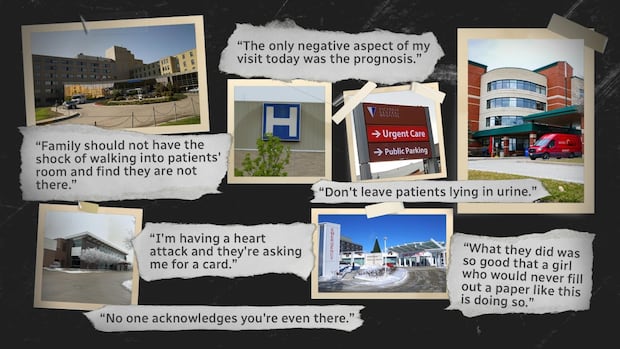A patient forced to find their health card while suffering from a heart attack, another who sat for hours in a waiting room with a bleeding head, and a third who went an entire day without a meal are among the experiences outlined in responses to a survey offered at Winnipeg health-care facilities.
A revealing look at how patients were treated while seeking care was captured by a Winnipeg Regional Health Authority patient survey. Each person who anonymously fills out the voluntary survey can add comments or suggestions.
CBC News obtained more than 9,000 through a freedom of information request for all survey responses from the first half of 2024. An AI model sorted through the answers and categorized them to help the CBC find examples for this story. All responses mentioned in this story have been manually double-checked.
Noah Schulz, provincial director of the Manitoba Health Coalition, an organization with union ties that advocates for public health care, is encouraged that a large majority of respondents felt positively — nearly 80 per cent of patients rated their overall experience an eight out of 10 or better.
However, the feedback from patients with negative experiences underlines the challenges facing a still-ailing health-care system.
“I always want to sympathize with those frustrations and with patients who are not receiving the care that they deserve, that maybe the workers also really want to be giving [them] and aren’t able to,” Schulz said.
“Health care, the stakes are high — these are life-and-death decisions.”
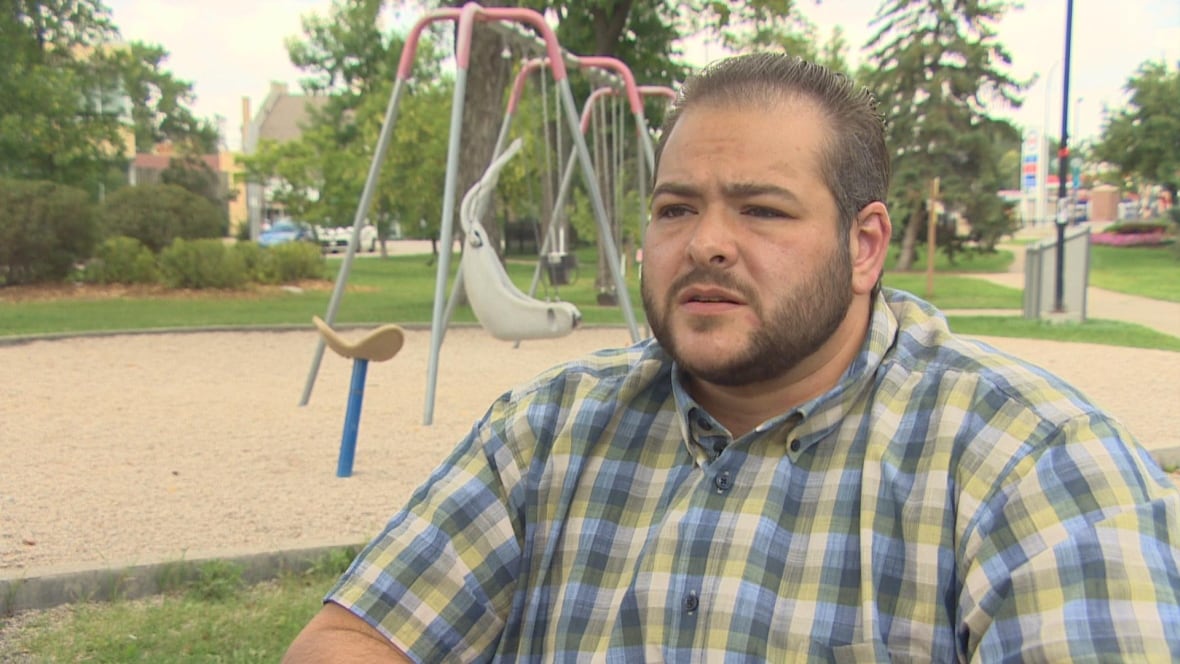 Noah Schulz, provincial director of the Manitoba Health Coalition, says he sympathizes with patients who’ve had negative experiences within the health-care system, as it’s something neither the patients nor the staff want. (Ron Dhailwal/CBC)
Noah Schulz, provincial director of the Manitoba Health Coalition, says he sympathizes with patients who’ve had negative experiences within the health-care system, as it’s something neither the patients nor the staff want. (Ron Dhailwal/CBC)
Some survey comments reveal the intensity of patient frustrations.
One person said they were holding their chest, struggling to breathe, when they approached the intake desk at St. Boniface Hospital. The patient was shocked the staff member still wanted documentation.
“I’m having a heart attack and they’re asking me for a card,” the respondent wrote. “I flopped and contorted for I don’t know how long trying to get my arms to move and my body to twist in the wheelchair … to get that card out.”
‘Understand how patients die’ in ERs
The patient was wheeled into the next room, where they said their heart attack was immediately recognized and they were rushed to surgery.
“I totally understand how patients die in the Winnipeg hospital emergency waiting rooms,” they wrote.
A recurring theme was lengthy wait times. One person described care moving at a “glacial pace.”
A patient bleeding from a head injury was in a waiting room at Seven Oaks General Hospital for three hours, across from a desk of medical professionals, “and not one person has said anything to me, asked me anything on how I was doing.”
“No one acknowledges you’re even there,” wrote one patient waiting in a bed at Concordia Hospital. “It would go a long way if someone would just walk up to you.”
While Schulz recognizes these frustrations, he said patients “have to think about the conditions the workers are under as well,” saying many staff are dealing with excessive workloads and severe staffing challenges.
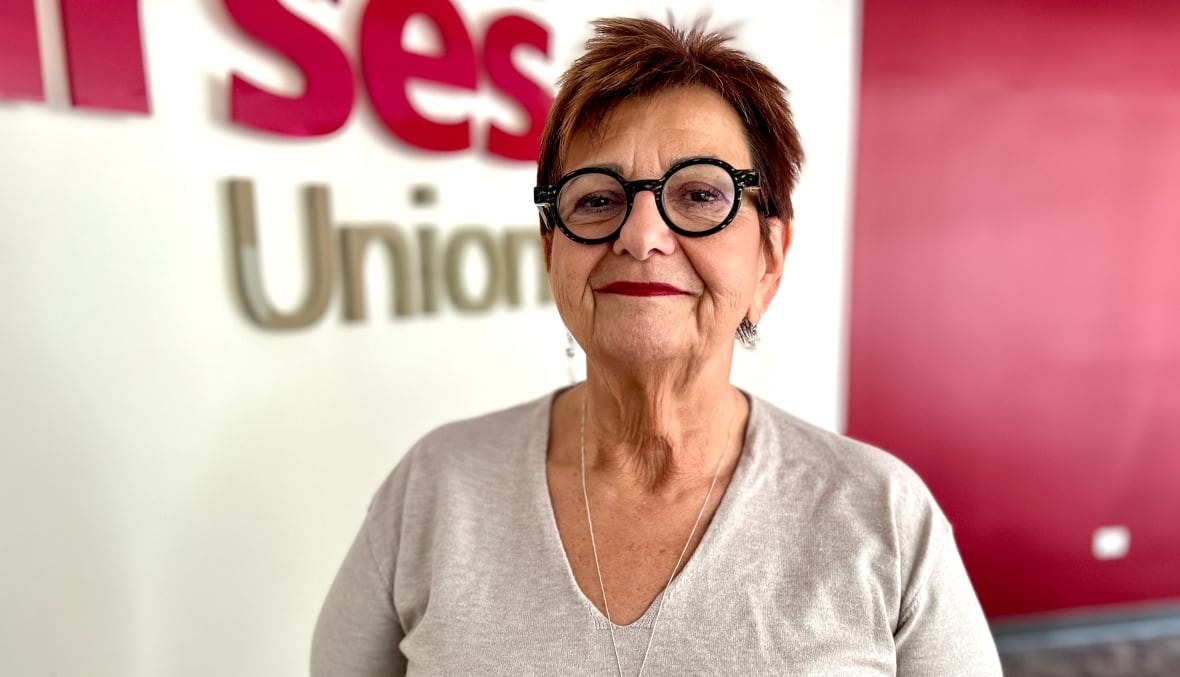 Manitoba Nurses Union president Darlene Jackson is asking patients and their families to be understanding as staffing shortages are impacting the care some people receive. (Travis Golby/CBC)
Manitoba Nurses Union president Darlene Jackson is asking patients and their families to be understanding as staffing shortages are impacting the care some people receive. (Travis Golby/CBC)
Manitoba Nurses Union president Darlene Jackson said people will encounter negative behaviour in all facets of life, not only in health care, but she recommends employers provide coaching or education to those employees struggling to provide proper care as the health-care system is under strain.
Jackson appreciates that some patients are understanding.
“How do you expect two triage nurses to properly triage one-third of the city’s medical emergencies,” wrote an ER patient at Grace Hospital, one of three Winnipeg hospitals with emergency departments.
A surgery patient at St. Boniface Hospital who provided a score of three out of 10 explained the ranking was “referring to the system and staffing levels — not the staff.”
Jackson said she was bothered that one survey respondent felt “anxious and uncomfortable” asking for help, because the patient didn’t want to overburden nurses who kept saying they were short-staffed.
“That makes me feel bad, because part of our job is to provide holistic care, where we provide everything for the patients’ needs,” Jackson said. “We’re at a place where we’re not able to do that.”
Many survey responses were positive, some even effusive in their praise.
“The only negative aspect of my visit today was the prognosis. Everything else was exceptional,” wrote a patient at Riverview Health Centre.
Rave reviews for staff
Someone receiving mental health care at Victoria Hospital raved about the nurses.
“What they did was so good that a girl who would never fill out a paper like this is doing so. Please inform them of such.”
A patient at Misericordia Health Centre asked about employment opportunities, because they wanted to work in this “wonderful environment.” Another at Deer Lodge Centre quipped they were “on vacation” because they didn’t have to cook, while an individual at Concordia Hospital said the nurses were some of the happiest people they’d ever met.
“It seems contradictory, but surgery was pretty darn near an enjoyable experience,” they said.
The survey, which started in 2022 as a pilot project, is available through QR codes and paper copies at WRHA hospitals, long-term care facilities and community health service areas. Winnipeg’s biggest hospital, Health Sciences Centre, isn’t included in the survey, as the facility is overseen by Shared Health.
Phone calls are now promised to every individual who rates their overall experience below a six out of 10, provided they want the call.
Other complaints received in the survey are call bells going unanswered, only one shower a week for patients on long-term stays and filthy conditions.
“Change bedding and soakers when wet,” said a patient at Victoria Hospital. “Don’t leave patients lying in urine.”
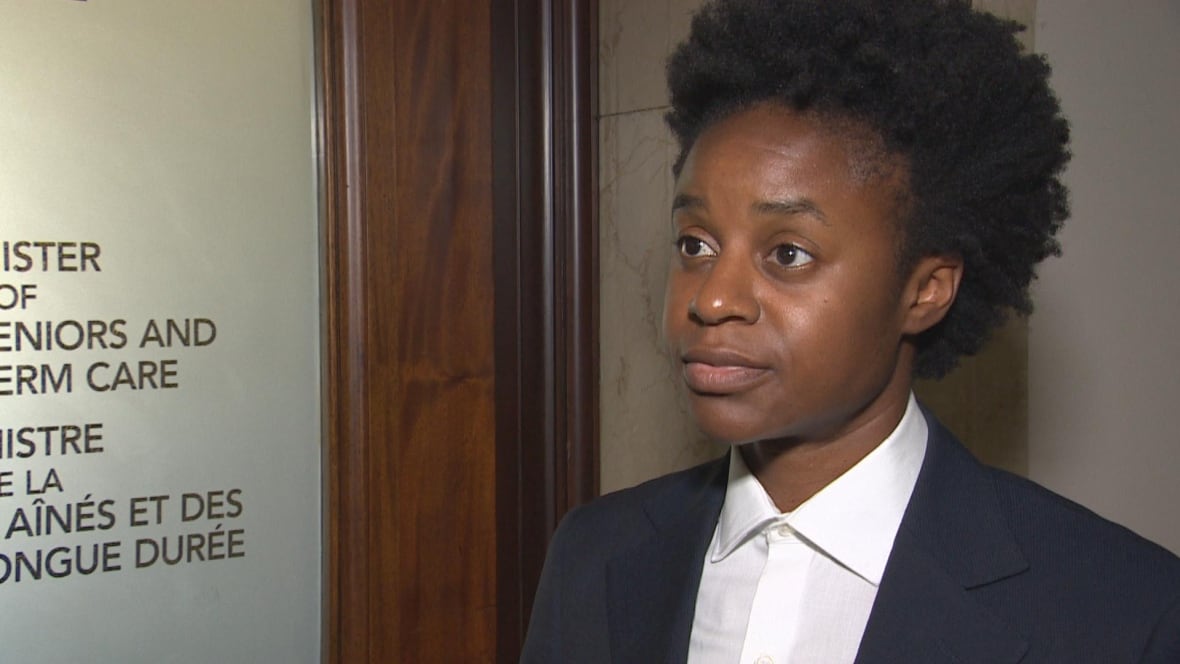 Manitoba Health Minister Uzoma Asagwara says they understand people continue to have negative experiences with health care, but it is important to note that a majority of individuals are satisfied with the care they receive, as a Winnipeg Regional Health Authority survey suggests. (Rudi Pawlychyn/CBC)
Manitoba Health Minister Uzoma Asagwara says they understand people continue to have negative experiences with health care, but it is important to note that a majority of individuals are satisfied with the care they receive, as a Winnipeg Regional Health Authority survey suggests. (Rudi Pawlychyn/CBC)
Some respondents complained about breakdowns in communication.
“Family should not have the shock of walking into patients’ room and find they are not there and be told they will have to wait for the nurse to be finished their break for information,” said a Seven Oaks patient.
The WRHA declined an interview, but said in a statement that around two per cent of respondents are offered a follow-up call based on how they answered the survey.
A spokesperson said survey feedback is incorporated into some daily meetings and some feedback is shared with staff.
Health Minister Uzoma Asagwara said there remains lots of work to do to improve health care — “I’m never going to minimize that” — but the minister stressed that members of the public and staff themselves should recognize most people have positive experiences.
“I think that’s really wonderful feedback that health-care workers don’t hear often enough.”
The minister appreciates that the WRHA solicits patient feedback so officials know where improvements can be made.
“We want to hear the good, the bad. We want to hear it all,” Asagwara said. “That’s the way we actually understand what we have to do better in the health-care system.”
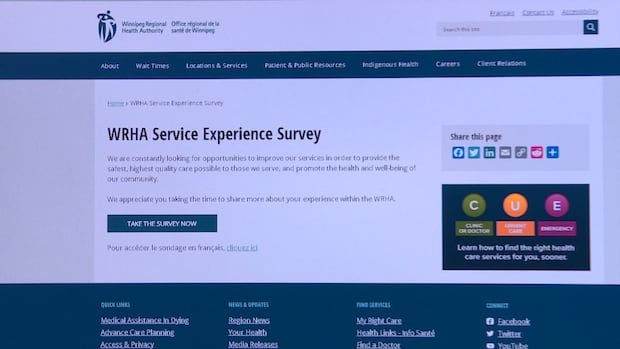
9,000 views on Winnipeg’s health-care system
The findings of a Winnipeg Regional Health Authority survey, released for the first time through a freedom of information request filed by CBC News, show a wide gamut of responses, though most patients said they had a positive experience.

